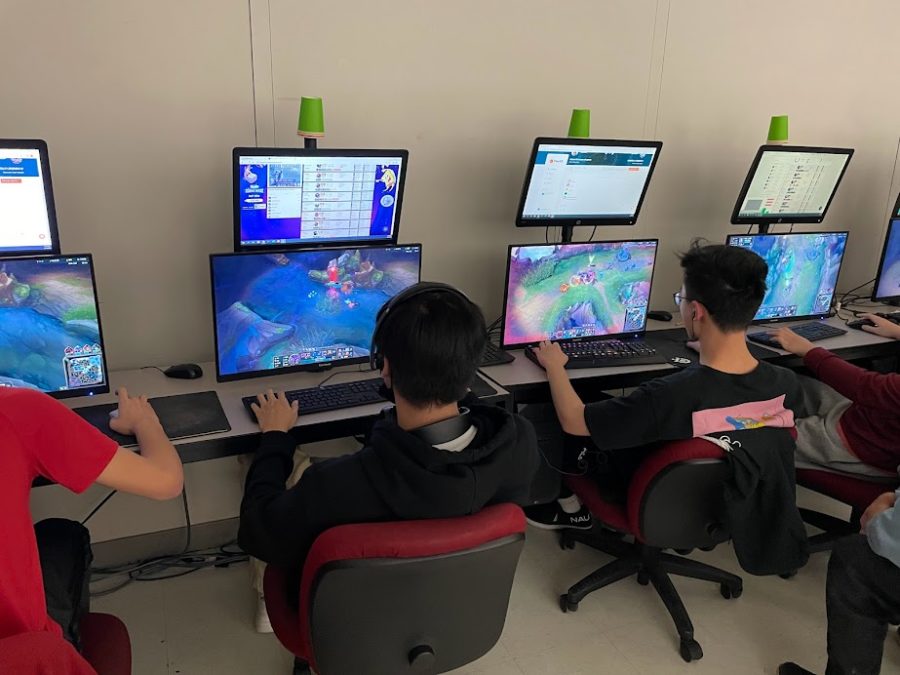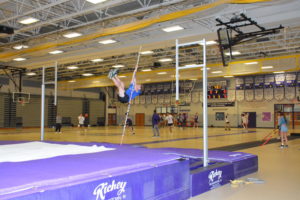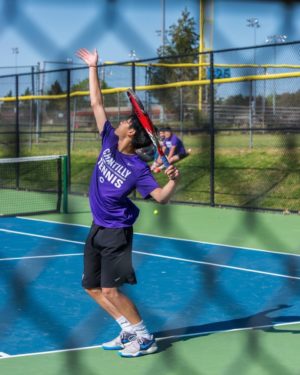Calling all gamers: Esports unlock new level of competition
Juniors Felix Do and Richard Xiong play League of Legends during the first esports competition on Feb. 14 in room 584. The first team played against Mclean and won, while the second team ended in a draw with Washington and Liberty.
April 9, 2023
With an emerging audience of 532.1 million people, esports is growing popular at a startling rate, according to Demand Sage. This year, FCPS competes for the first time in the emerging Virginia High School League (VHSL) sport, and VHSL has until the 2023-2024 school year to decide if esports will become a fully sanctioned and sponsored activity.
Esports are multiplayer competitive video games in which spectators enjoy watching professional gamers play. Stepping into the spring season, esports are a new and unexplored territory that CHS hopes to navigate, carrying it out for years to come.
“Esports has been in the works with Fairfax County for a while because so many kids play,” assistant student activities director Kevin Ford said. “We wanted to try to at least get it started.”
As of the 2023 spring season the two games available for playing are League of Legends and Rocket League. Developed by Riot Games, League of Legends is a team-based strategy game centered around two teams aiming to demolish the other’s base by destroying the Nexus, a device allowing characters to stay on the field. Meanwhile, commonly described as car soccer, Rocket League resembles a soccer game, but played by vehicles hitting the ball into goals.
“I really liked Rocket League because it kind of resembles real life sports,” senior Pankaj Rapuru, who attended the esports interest meeting, said. “There’s an actual strategy, and it’s not like some other sports like FIFA where you press a button and it passes. All the controls are pretty manual.”
Members must play the games through school computers but are allowed to bring their own headsets, keyboards and computer mice. This restriction has proved challenging because of Fairfax County’s security involving non-academic websites.
“One of the things that has held all of this up is working through the firewalls of computer security,” Ford said. “Fairfax County is very strict on what they allow through.”
Students play the sports on a VHSL approved system called PlayVS, an official platform for amateur esports competitions. PlayVS has specific rules of conduct, including being respectful to players, coaches and league officials, using appropriate language and playing with integrity.
“Having a controlled environment will cut down on toxic players, language and other things that might not be appropriate for high school kids,” esports coach Jakob Hughes said.
Practices and competitions happen similarly to other VHSL sports, being after school and in supervised environments, but travel is not necessary for competitions since they occur online. Games occur during the week with League of Legends playing after school on Tuesdays, and Rocket League on Thursdays, with a couple of teams for each game competing against other schools. The county is working on sending out packages to other schools next year to provide resources such as computers for students to play on, focusing on getting at least two League of Legends teams and three Rocket League teams in each school.
“Esports is intense,” Hughes said. “Half these kids have probably been playing for half their lives, so they put a lot of time and effort into it and they deserve to compete.”
As a VHSL sport, esports has academic requirements, and if they are not met, the student cannot remain on the team. Requirements include being enrolled in 5 classes and passing 5 classes from the last semester grade.
“Parents see their kid put a lot of time and effort into playing video games, when really they’re just trying to get better at it,” Hughes said. “There are also a lot of people who are going to be doing better in academics because they want to be a part of the team. So, if there’s an ability to show that there’s a way up and profit off of those skills and activities, then I think parents would probably be more open to it.”
There are a lot of positives to video games, especially going competitive. According to Exploding Topics, the top esports players have won over $7 million in competitions and the top earning esports organizations make over $90 million. Other benefits include improving strategy and encouraging teamwork, as well as increased hand-eye coordination.
“When you look at our society, esports is televised on TV,” Ford said. “I know I’ve seen it a couple of times on TNT, the big arena with teams five on five playing and it’s definitely become something you can go to college for.”
Many universities and colleges give merit based scholarships for esports. According to Unigo, esports scholarships are awarded through displaying highlight reels of gamer’s best games, meeting academic standards, competing in live tournaments or trying out for esport teams. Awards can range from $5k to $8k per year, or even full rides.
CHS aims to include even more games, such as Super Smash Ultimate, in the coming seasons. Matches will continue every Tuesday and Thursday, and coaches hope for a shot in championships.
“I think if you are an underclassmen, and you have the time to put into school sports, you should try it out,” Rapuru said. “And who knows, you might go really high up and then you’ll be playing in a university off campus.”






